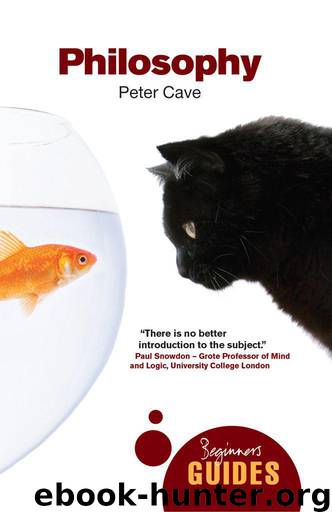Philosophy (Beginner's Guides) by Cave Peter

Author:Cave, Peter [Cave, Peter]
Language: eng
Format: mobi
ISBN: 9781780741161
Publisher: Oneworld Publications (trade)
Published: 2012-09-05T23:00:00+00:00
Back to behavioural basics
We are neither born aware of linguistic meanings nor lucky recipients of magical learning. We develop language from infancy with people using terms such as ‘pain’, ‘thinking’ and ‘remembering’ of us, when we behave in certain ways; we pick up such uses. Grasp of the meaning of those psychological terms involves grasp of associated behaviour: ‘meaning is use’.
The woman thinking of England is disposed to utter words about England, but maybe she will utter them only if asked and in certain circumstances. Those circumstances involve reference to other psychological states, whether she wants to speak, whether she feels embarrassed and so forth. Awareness of the complex web of psychological states relating to potential behaviour has led to recent support for ‘functionalism’. The approach is but sophisticated behaviourism. Psychological states, according to functionalism, are complex functions and functions are causal roles.
Let us focus first on psychological states involving thoughts, intelligence and understanding, then more directly on qualia.
Alan Turing – yes, he of computer fame and who led the team that cracked the Enigma Code in World War II – suggested a test, the Turing Test, for whether there could be artificial intelligence, whether a machine could be ‘minded’. The test is in the spirit of functionalism. Suppose a machine (a robot, a computer) with perfect human speaking devices is hidden from view – as is also a human. If interrogators, by simply asking the same questions of both hidden machine and hidden human, cannot tell whether they are in dialogue with the machine or human, then the machine is as intelligent as the human. Of course, sufficiently wide-ranging questions need to be asked (not, for example, just concerning mathematical calculations) and the machine needs to be programmed to provide sufficient human foibles – the ‘er’s, ‘y’knows’ et al. Let us use some analogies to see the consequence of this view.
A piece is a knight in the game of chess when it plays a certain role. One chess-set may have wooden pieces, another set ceramic, yet another, pixels on screen. What is essential is the knightly role, not the stuff which composes the piece. Similar comments may be made about clocks and weapons, and – drawing closer to psychological home – banks’ answering systems may consist of digital automation, old-fashioned tapes or living employees, desperate for work, in far-off lands. The above illustrates how certain roles or states with a readiness to respond may be multiply realizable. So too are psychological states, according to functionalists, thus avoiding the bio-chauvinism of traditional identity theories. The mind, speaking casually, is akin to a programme that may run on different hardware or biological wet-ware. Our psychological states are causal roles manifested by neural firings that can affect human bodies; those same psychological states, though, do not have to be manifested in neural firings. Perhaps the causal roles could have been played by changes in the heart, by circuits of silicone chips, or even outlandish spiritual items. Thus, octopuses, even aliens of different
Download
This site does not store any files on its server. We only index and link to content provided by other sites. Please contact the content providers to delete copyright contents if any and email us, we'll remove relevant links or contents immediately.
The remains of the day by Kazuo Ishiguro(8949)
Tools of Titans by Timothy Ferriss(8347)
Giovanni's Room by James Baldwin(7301)
The Black Swan by Nassim Nicholas Taleb(7087)
Inner Engineering: A Yogi's Guide to Joy by Sadhguru(6776)
The Way of Zen by Alan W. Watts(6578)
Asking the Right Questions: A Guide to Critical Thinking by M. Neil Browne & Stuart M. Keeley(5741)
The Power of Now: A Guide to Spiritual Enlightenment by Eckhart Tolle(5725)
The Six Wives Of Henry VIII (WOMEN IN HISTORY) by Fraser Antonia(5486)
Astrophysics for People in a Hurry by Neil DeGrasse Tyson(5169)
Housekeeping by Marilynne Robinson(4420)
12 Rules for Life by Jordan B. Peterson(4292)
Double Down (Diary of a Wimpy Kid Book 11) by Jeff Kinney(4252)
The Ethical Slut by Janet W. Hardy(4232)
Skin in the Game by Nassim Nicholas Taleb(4224)
Ikigai by Héctor García & Francesc Miralles(4219)
The Art of Happiness by The Dalai Lama(4116)
Skin in the Game: Hidden Asymmetries in Daily Life by Nassim Nicholas Taleb(3973)
Walking by Henry David Thoreau(3939)
